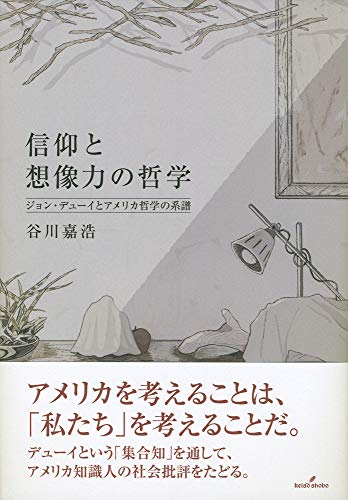6 0 0 0 OA ゲームはどのような移動を与えてくれるのか:マノヴィッチとインゴルドによる移動の感性論
- 著者
- 谷川 嘉浩
- 出版者
- 立命館大学ゲーム研究センター
- 雑誌
- REPLAYING JAPAN (ISSN:24338060)
- 巻号頁・発行日
- vol.2, pp.165-175, 2020-03
4 0 0 0 IR 作文はなぜ知的独立性の問題になるのか : 鶴見俊輔,生活綴方,想像力
- 著者
- 谷川 嘉浩
- 出版者
- 京都大学大学院人間・環境学研究科
- 雑誌
- 人間・環境学 (ISSN:09182829)
- 巻号頁・発行日
- vol.27, pp.89-99, 2018
本稿は, 経験を書くこと, 生活を記録することをめぐる鶴見俊輔の思想を探索する. 彼の思想を貫くのは, 日本の知識人が状況変化に応じて態度転換していったことへの批判である. その場の解答をなぞるだけの優等生は, 知的独立性を失いがちなのだ. これへの対処として, 自身の経験に基づく作文に鶴見は注目した. 本稿の目的は, 自己を含む状況全体を相対化する契機を, 鶴見がどのように確保したのかを明らかにすることである. 彼の「方法としてのアナキズム」に基づき, 生活綴方論以降の彼の作文論で, 当初の想定と現実との齟齬への注目が重視されること, そして, 齟齬と対峙する人間の力を「想像力」に帰したことを明らかにする. さらに, 想像力が繰り返し立ち返る場となるように, 鶴見が提出した経験を書く際の基準について, 後年展開された彼の文章論を踏まえて論じる.
3 0 0 0 信仰と想像力の哲学 : ジョン・デューイとアメリカ哲学の系譜
2 0 0 0 IR ゲームはどのような移動を与えてくれるのか : マノヴィッチとインゴルドによる移動の感性論
- 著者
- 谷川 嘉浩
- 出版者
- 立命館大学ゲーム研究センター
- 雑誌
- Replaying Japan (ISSN:24338060)
- 巻号頁・発行日
- vol.2, pp.165-175, 2020
- 著者
- 谷川 嘉浩
- 出版者
- ミュー
- 雑誌
- フィルカル : philosophy & culture : 分析哲学と文化をつなぐ
- 巻号頁・発行日
- vol.3, no.2, pp.140-174, 2018-09-30
- 著者
- 谷川 嘉浩
- 出版者
- 京都大学大学院人間・環境学研究科『人間存在論』刊行会
- 雑誌
- 人間存在論 = Menschenontologie (ISSN:13412698)
- 巻号頁・発行日
- vol.26, pp.13-27, 2020-07-01
The Japanese pragmatist Shunsuke Tsurumi thought more highly of "writing" than "reading". While his view of writing is rather classical, his theory of interpretation is not. He insists that teachers should not teach how to read: people should find their own radical "interests" or "conatus, " and cause resonances of conatus in the action of reading. Conatus is an idea borrowed from William James's reading of Spinoza. James insists interpretations should be based on one's own conatus. If the interpretations are irrelevant to their interests, they will be forceless and non-functional. And Tsurumi agree with his argument. For Tsurumi, reading is an action of matching two sides, a writer and a reader. Here, the reader should find in the text something connected with their own conatus. Tsurumi calls it "unlearning" or gainen kudaki. If the self is not something stable and fixed (self-pluralism), radical interests are plural too. Thus, one's reading should enable various interpretations in the same text. But the actual interpretations proposed by Tsurumi himself is different and this is because of his focus on personal history and his episodic method. Tsurumi repeatedly mentioned people's personal history including his, and hastily used their episodes to understand others. This paper is intended to reconstruct his theory of interpretation and to understand how and why he could not put his own theory into practice.
1 0 0 0 OA 作文はなぜ知的独立性の問題になるのか --鶴見俊輔, 生活綴方, 想像力--
- 著者
- 谷川 嘉浩
- 出版者
- 京都大学大学院人間・環境学研究科
- 雑誌
- 人間・環境学 = Human and Environmental Studies (ISSN:09182829)
- 巻号頁・発行日
- vol.27, pp.89-99, 2018-12-20
本稿は, 経験を書くこと, 生活を記録することをめぐる鶴見俊輔の思想を探索する. 彼の思想を貫くのは, 日本の知識人が状況変化に応じて態度転換していったことへの批判である. その場の解答をなぞるだけの優等生は, 知的独立性を失いがちなのだ. これへの対処として, 自身の経験に基づく作文に鶴見は注目した. 本稿の目的は, 自己を含む状況全体を相対化する契機を, 鶴見がどのように確保したのかを明らかにすることである. 彼の「方法としてのアナキズム」に基づき, 生活綴方論以降の彼の作文論で, 当初の想定と現実との齟齬への注目が重視されること, そして, 齟齬と対峙する人間の力を「想像力」に帰したことを明らかにする. さらに, 想像力が繰り返し立ち返る場となるように, 鶴見が提出した経験を書く際の基準について, 後年展開された彼の文章論を踏まえて論じる.
- 著者
- 谷川 嘉浩
- 出版者
- 京都大学大学院人間・環境学研究科
- 雑誌
- 人間・環境学 (ISSN:09182829)
- 巻号頁・発行日
- vol.26, pp.107-118, 2017
FD義務化を経て, 外来的なFDも日本国内に定着したように見える. しかし, 実際のFD実践・FD概念は多義的で錯綜しており, 交通整理を要する. 本稿では, FD概念を整理し, FDの根本目的を示した上で, それに適合的な思想を検討し, 効果的なFDの理論的条件を明らかにする. FDのミッションは「教育」であり, そこでは「柔軟な適応力」と呼べるような, 反省的探求を営む力の涵養が目指されている. 柔軟な適応力の内実を解明するために, 人間は現状に安定しない「未熟さ」があり, それが成長可能性を担保すると主張した, アメリカの哲学者ジョン・デューイの教育哲学を参照する. ここでは, 彼の「反省的注意」概念を検討し, その成果をアメリカの社会学者R. セネットのクラフツマンシップ論から捉え直すことで, FD活動それ自体が, 折り重なる反省的注意を大学全体に要求するような, 共同的な反省的探求の側面を持つことを示す. なお, 末尾では2017年度に義務化されたスタッフ・ディベロップメントにも一定の評価を行う.Faculty Development (FD) has become common in Japan. But it seems to be ineffective because the ideas of FD in Japan are lacking some holistic view. This paper aims at clarifying some theoretical conditions of the effective FD. The researchers have pointed out that its primary ends lie in education. I will define its educational ends in the light of the industrial world's need for FD. The capacity they need may be called the "power of the flexible adjustment", and this can be identified with the "reflexive attention" which John Dewey, an American psychologist, set up as the ends of his educational philosophy. According to his thoughts, I will elucidate some bases to develop reflexive attention which enables us to acquire the habits of reflexive inquiry. In The Craftsman, Richard Sennett, an American sociologist, insists that Dewey's philosophy has some practical implications. From his viewpoint, FD may be interpretedas the communal or cooperative craft of education that needs faculty members to have the reflexive regards for each. This view would imply the importance of having "a holistic view" by crafting the communities for FD.
